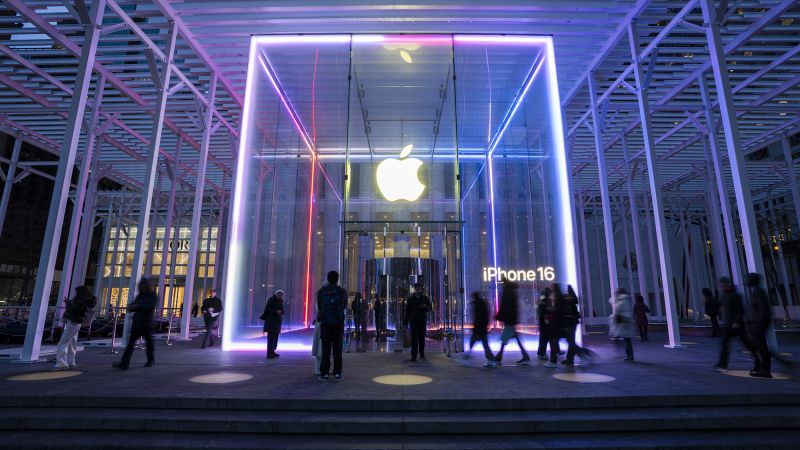In a significant move to bolster its operations within the United States, tech giant Apple has announced a hefty investment of $100 billion. This new financial commitment, which President Donald Trump is poised to unveil, highlights Apple’s ongoing efforts to expand its domestic footprint. According to a White House official, this announcement marks another step forward for the company, which had already pledged $500 billion earlier in the year to foster growth in its U.S. operations.
The investment comes amidst a backdrop of trade tensions, particularly as Apple has previously incurred substantial expenses due to tariffs imposed by the Trump administration. These tariffs have had a notable impact on the company’s financial decisions, prompting a reassessment of its supply chain strategy. Taylor Rogers, a White House spokesperson, provided context by stating, “President Trump’s America First economic agenda has secured trillions of dollars in investments that support American jobs and bolster American businesses.” This announcement is framed as a victory for the manufacturing sector, aiming to reshore the production of critical components essential for strengthening both the economic and national security of the United States.
At the core of Apple’s new initiative is the launch of an American Manufacturing Program, designed not only to bring more of Apple’s supply operations to American soil but also to incentivize other U.S. companies to manufacture components domestically. By doing so, Apple aims to lessen its reliance on foreign assembly facilities located in countries such as China, India, and Vietnam. However, experts express skepticism regarding the feasibility of such a transition, citing a shortage of skilled workers and higher labor costs in the U.S. that may hinder these ambitions.
Bloomberg was the first outlet to report on Apple’s forthcoming announcement, which sparked a notable reaction within the stock market. On the day of the announcement, shares of Apple (AAPL) saw a 3.5% increase, marking its largest one-day gain since May, despite the company’s stock being down approximately 16% for the year. This corporate maneuver aligns with the Trump administration’s persistent call for tech companies to transition manufacturing efforts back to the United States, a push that comes amid ongoing trade disputes and tariffs on various imports.
Complicating the scenario, Trump has publicly threatened both Apple and rivals like Samsung with additional tariffs unless they commit to producing their devices domestically. He reiterated his stance on the matter in a post on Truth Social, stating, “I have long ago informed Tim Cook of Apple that I expect their iPhones that will be sold in the United States of America will be manufactured and built in the United States, not India, or anyplace else.”
Amidst these developments, Apple’s CEO, Tim Cook, has engaged in discussions with Trump regarding the impacts of tariffs on the company, highlighting a nuanced relationship between the tech sector and governmental policies. Cook indicated that Apple anticipates incurring tariff-related costs of approximately $1.1 billion during the September quarter, reflecting the strain that these trade measures have placed on the tech industry.
The timing of the announcement is particularly crucial as it coincides with a recent escalation of tariffs on imports from India, a key market for Apple’s assembly operations. Notably, while smartphones are generally exempt from Trump’s reciprocal tariffs, which include the newly instituted 25% tariffs on imports from India, the complications surrounding tariff regulations highlight the intricate challenges faced by tech firms in navigating international trade.
As part of its earlier commitment to invest $500 billion, Apple plans to inaugurate a manufacturing academy in Detroit aimed at enhancing local skills. Additionally, the company intends to source critical materials such as rare earths from domestic suppliers, thereby contributing further to the U.S. economy.
Despite facing an array of challenges, including pressures from competition in the artificial intelligence realm, analysts maintain a cautiously optimistic outlook for Apple’s ability to withstand tariff-induced setbacks. Ted Mortonson, a technology strategist at financial services company Baird, emphasized Cook’s strategic prowess in navigating supply chain dynamics, suggesting that Cook and his team are well-prepared for any shifts prompted by government regulations.
In summary, Apple’s latest investment embodies a broader trend among tech giants, including companies like Texas Instruments and Nvidia, which have also announced significant commitments to U.S. manufacturing. As the landscape of American manufacturing evolves, Apple’s efforts serve as an indicator of how major corporations are responding to both political pressures and the changing dynamics of the global supply chain. This developing story is likely to evolve, with ongoing updates anticipated.











